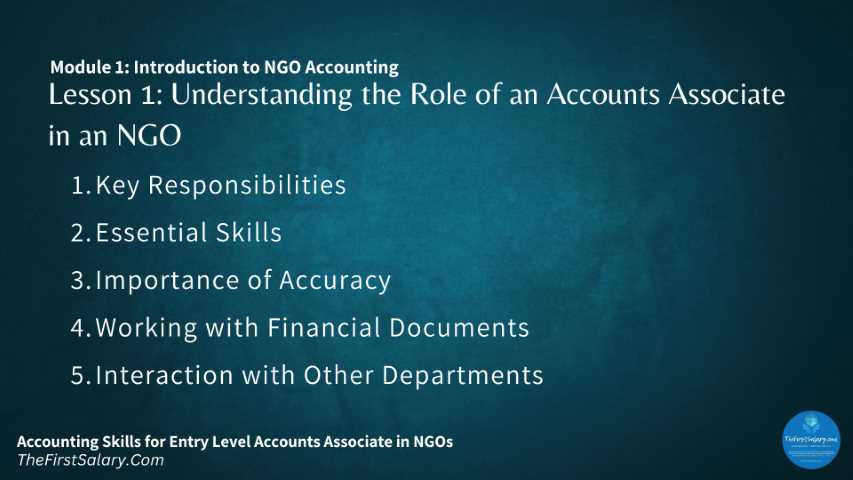
Module 1: Introduction to NGO Accounting
Lesson 1: Understanding the Role of an Accounts Associate
The role of an Accounts Associate in an NGO is crucial for supporting accounts and finance team in maintaining financial accuracy and transparency. This lesson will cover the responsibilities and skills needed to excel in this role. By the end, you’ll understand how to effectively contribute to your organization’s financial health.
Key Concepts:
• Key Responsibilities
• Essential Skills
• Importance of Accuracy
• Working with Financial Documents
• Interaction with Other Departments
1. Key Responsibilities:
» Maintaining Financial Records:
Accounts Associates are responsible for keeping accurate and up-to-date financial records. This includes tracking all transactions, managing accounts payable and receivable, and reconciling statements.
» Processing Transactions:
They handle day-to-day transactions such as payments, receipts, and invoices. Proper processing ensures that all financial activities are recorded correctly.
» Generating Reports:
Regular reports on financial status, budget performance, and expenditures are prepared. These reports help in assessing the financial health of the NGO and making informed decisions.
2. Essential Skills:
» Attention to Detail:
Accuracy in recording and processing financial data is crucial. Small errors can lead to significant financial discrepancies.
» Analytical Skills:
Accounts Associates must analyze financial data to identify trends, discrepancies, and areas for improvement.
» Communication Skills:
Clear communication with team members and other departments is essential for accurate financial reporting and addressing any financial issues.
3. Importance of Accuracy:
» Preventing Errors:
Accurate financial records prevent errors that could lead to financial mismanagement or compliance issues.
» Ensuring Compliance:
Accurate data ensures adherence to legal and regulatory requirements, avoiding potential penalties and ensuring transparency.
4. Working with Financial Documents:
» Document Management:
Accounts Associates manage various financial documents, such as receipts, invoices, and financial statements. Proper organization and storage are key for efficient access and compliance.
» Record Keeping:
Keeping detailed records of all transactions helps in audits and financial reviews, ensuring that all financial activities are traceable.
5. Interaction with Other Departments:
» Collaborating with Finance Team:
Accounts Associates work closely with the finance team to ensure consistency in financial records and reporting.
» Supporting Project Teams:
They assist project teams by providing financial data and insights to help with budgeting and financial planning.
» Practical Application:
Steps to Manage Financial Records:
1 Record all transactions promptly.
2 Reconcile accounts regularly.
3 Prepare and review financial reports.
4 Communicate discrepancies to the finance team.
» Practical Task:
Imagine you’re processing monthly payments and invoices for an NGO. Track each invoice, record the payment, and generate a summary report for the finance team.
Example: An Accounts Associate at an NGO successfully managed financial records, ensuring timely payments and accurate reports. This contributed to smooth financial operations and compliance with regulations.
Questions:
1 What are the primary responsibilities of an Accounts Associate?
2 Why is accuracy important in financial management?
» Common Mistakes:
• Neglecting Record Keeping: Failing to keep detailed records can lead to difficulties in audits and financial tracking.
• Errors in Data Entry: Mistakes in entering financial data can cause discrepancies in reports and financial statements.
• Ignoring Reconciliation: Not reconciling accounts regularly can result in unresolved discrepancies and inaccurate financial data.
» Summary:
This lesson covered the vital role of an Accounts Associate, including key responsibilities, essential skills, and the importance of accuracy. Understanding these aspects helps in maintaining effective financial management in NGOs.
» Takeaways:
• Accurate record-keeping and transaction processing are crucial.
• Essential skills include attention to detail and analytical abilities.
• Regular reconciliation and clear communication are necessary.
FAQs:
What does an Accounts Associate do?
They support the accounts and finance team to maintain financial records, process transactions, and generate reports.
Why is attention to detail important?
It prevents errors and ensures accurate financial reporting.
How do Accounts Associates interact with other departments?
They collaborate with the finance team and support project teams with financial data.
What are common mistakes in managing financial records?
Common mistakes include neglecting record keeping and data entry errors.
What skills are essential for an Accounts Associate?
Attention to detail, analytical skills, and communication are essential.
